|
If you're an NF fan then there is no doubt that today has been quite an exciting day for you. For those of you that don't know, the rapper just dropped his newest song CLOUDS, which is the first track from his upcoming mixtape that will be released on March 26th (YAY). I discovered NF when I was in a pretty low and dark place in my life. To listen and hear music from someone who got it, who understood, was a saving grace. NF's music is real -- real music til the day we die, ain't that the slogan, Nathan? If you know, you know. Anyways, Nathan's music is real. He's not only an amazing lyricist but also an amazing communicator of real, deep feelings. He puts words, music and identity to feelings that previously just bubbled and stirred in my spirit unattended and untouched. NF's music is a huge release for me emotionally. I know this isn't just the case for me but for his hundreds of thousands of fans around the world. He's real. He's relatable. I discovered this more and more as I listened to The Search, his fourth studio album, all the way through for the first time. It was actually the first album of his that I listened to. When the punctuating strings faded out at the end of "Let Me Go," I was surprisingly greeted by a conversational Nate in "-Interlude-". This is what he says in the 50-second vent about how he felt during the Perception period: My most considered, like, "successful" moment of my life was the worst The most depressed I've ever been Literally feeling like I'd probably be happier if I was just dead I got a number one on Billboard, my song is massive right now Like, I may never have a song this big again My tour, I think every date sold out except one date So I literally had everything that I had always dreamed of happening (Yeah) And I felt...I didn't feel happy at all And so I think what happened was I spiraled really bad 'Cause I was like, "I'm here, and if this is it There's gotta be more for me 'Cause if this is it, like, it's not gonna work" That fifty seconds stopped me dead in my tracks because that's EXACTLY what I was experiencing at the time -- minus, of course, having a number one on Billboard and my song being massive. The most depressed I've ever been was at a time in which, outwardly, I was experiencing the most "success" I've ever had. And I literally had spoken those words in my mind: "If I'm here, and if this is it…what's the point?" I had everything I'd ever dreamed of and longed for happening: I'd been accepted to the Early Entry Master's Program at UNC Charlotte, I was executing my own research, I was regularly handling venomous snakes, I had spent a month in one of the wildest places on earth and I was a dolphin training intern at the Georgia Aquarium. If you've known me for any amount of time, you'd know just how much and how long I had longed for those things up until that point.
While there were a lot of contributing factors to my depression at the time, I think the greatest underlying problem was that I had everything I'd ever wanted and none of it was deeply satisfying in the ways that I had expected them to be. Everything that I had put my hope in satisfied me in an incredibly superficial way. In a way, I felt betrayed by God and by those things. One of the worst parts of the experience, however, was that I didn't even realize that I'd put my hope in those things. It was something so deeply rooted in me that I wasn't even aware that it was happening, this idolization of different things that I thought would satisfy me (I would often repeat to myself years before I even thought about going to Botswana, Just wait until I get to Africa -- then everything will be alright). I'm so grateful to serve a God who knows us, though, who knows me and who knows that I'll believe something until it's proven wrong. Who knows that until I experienced the degree of superficial satisfaction that being in Botswana would bring, I wouldn't actually believe it. I was doing everything I ever wanted to do and my soul was still crying out for something deeper. This realization of dissatisfaction threw me into a spiral of depression. It was during this period of depression that the Lord stripped me of every idol that I had, tearing down each and every one of them at the same time: the hope of my relationship, my career, my future. All of it. I questioned whether or not my faith was even worth it. I questioned whether or not life was even worth it. Boy, was that a deeply painful season. Then I heard a 50 second vent session from a rapper that somebody randomly recommended to me and I realized that I wasn't alone in how I felt. It didn't take away the depression or the pain. To have my feelings expressed, identified and named by someone else hit in a way that I didn't expect: somebody understood me. Somebody else had experienced the shattering disappointment of their dreams not satisfying them. Somebody else had experienced the fear and distress and sorrow that accompany that sort of realization. Somebody else had experienced the heartbreak of being disillusioned for so long and then being jolted awake to a reality they never imagined. Someone else experienced a state of utter despondency from which rescue efforts felt futile. NF helped me acknowledge my feelings and see God through it all. I wouldn't trade that season for anything, as painful and emotionally exhausting as it was. God tore down every idol I had in my life at that time and showed me that He is the ONLY thing worth hoping in. He is the only satisfying thing. Everything I loved and craved about my dreams, I later discovered, are actually attributes of God. I was unknowingly longing for God in all of that (I'll write another post about this later). In God I experienced the satisfaction of my soul. I felt like I understood Psalm 42:7: "Deep calls to deep in the roar of your waterfalls; all your waves and breakers have swept over me." I now know that God is the only thing worth pouring every ounce of my passion into, as He is the only deeply satisfying thing. I write this as both an encouragement and a precaution to anyone who may find themselves longing for the future, telling yourself once you get to a certain place or job position or in that relationship that they'll be satisfied. That's a lie from the enemy. The satisfaction will not be deep, nor will it be lasting. So take it from both NF and myself that it's not worth it to put your hope in anything other than God. If you do find yourself in that place, I'd really encourage you to spend some time with God. Ask Him to show you the ways that you're putting hope in the future or in achievements. I trust that He'll bring those up. Then pray a prayer of confession and repentance. It could go something like, "God, I'm sorry for the ways I've knowingly and/or unknowingly put my hope in anything other than You. Please help me want to want to put my hope in you. Satisfy the parts of me that are longing for things other than You. Satisfy my soul -- overflow my cup." I trust that He'll do it. You may not feel a change right away, but it doesn’t mean that nothing is happening. If you have any questions or want to talk more, don't hesitate to reach out to me on my "Connect" page or by DMing me on Instagram. Also, go give CLOUDS a listen. :)
1 Comment
In a training this past Sunday, Brent reiterated the importance of setting time apart for God in every part of one's day. The mindset he offered was incredibly helpful in reminding me personally of one of the core reasons why I spend time with God:
"I want to be available to God and unavailable to the world so that I can recognize and hear His voice when it matters. Let me take this seriously, even if it means that for 15 minutes in the mornings I’m trying to not fall asleep. We want to get to a place where we have consistency in which God can intervene if necessary. We just want to be open. For x amount of time everyday for the first portion of the day, if You need to catch my attention or get a hold of me, that’s when I’ll notice." My goal for this week has been to reengage with that simple practice. When I began to do that yesterday morning the Lord convicted me about how much time I've spent at the gym compared to how much time I've intentionally spent with Him this week. I felt His quiet voice say You're spending 2 hours at the gym every day and you can't set aside time to spend with me? It was accompanied by a warning about how quickly idols can take root in my own heart. Stop working out with your trainer, I felt like I heard. I was SO quick to say 'no' that it surprised me -- the Lord brought to my attention that THAT was the issue that He was concerned about: my adamant lack of willingness to give something up at His command. I immediately knew I had a heart problem I needed to check. It wasn't hard for me to diagnose the reason for my response, other than my humanness. I am SO happy right now with where I'm at in the gym -- I'm finally training at a high level again, I can genuinely say that I love my body and I'm making a lot of progress with my strength. I'm just really happy. The time I spend in the gym is truly an escape. The fact that my knee-jerk reaction to the Lord was a hard 'no' exposes the parts of me that still struggle to believe that God cares about my happiness and that He is a good Dad. On the contrary, deep down I fear that He'll take my happiness away and that, if I'm not in control of my happiness, it's not safe. Like any good father, though, once His child begins to have an unhealthy amount of a good thing, He'll take it away. It's all for the health and protection of the child, even if it doesn’t feel like that at the time. The truth is, God wants to give us the best if we'd just get out of our own way and let Him. This is a truth that I constantly have to remind myself. After spending more time in prayer and self-reflection, and after consulting a multitude of counselors, I decided that the warning came as a means of revealing what was in my heart, the potential for too much of this good thing to turn into an idol. In response, I plan to do a few things:
I love the Lord's intentionality, though. In the three weeks since I began being trained I have learned an incredible amount about my own mental strength and toughness. In a way, it has been revitalized. You learn a lot about pushing past your limits when you have someone standing over your shoulder telling you that you can finish out the third twenty-rep set before throwing more weight on the bar. I say this because it's applicable -- even when I don't think I can create a space for God, or even if I don't want to at the moment, I know I can do it, no matter how tired or uncomfortable I might be. I also know that I can be consistent if I really, truly put my mind to it. Granted, there's grace in all of this because God knows more than anybody how hard consistency has been for me in the past. However, what I've learned throughout the years, and what I will continue to learn, is that the Lord cares far more about trying and faithfulness than He does about the outcome. Did you fall asleep 8 minutes into your quiet time with Him? Yeah, but that was after trying everything you could to stay awake. Cool. Good sees and honors that. Honestly, this blog post in itself is an attempt at me trying. I couldn't tell you how many times I've decided that "THIS TIME I'll start to be more consistent on my blog." It only takes a quick look at my archives to see how that has gone… I'm very grateful that God is so incredibly patient, kind and merciful and that He cares a lot more about our attempts to be faithful than He cares about the outcomes. Is there any area of your life that you feel you have kept off-limits to God? Why do you think that is? What would it look like for you to respond in faithfulness? As always, feel free to share. If it's too personal for you to share here, don't hesitate send me a private message via the Connect Page or on my Instagram. There is much to be learned from animals, and I often find myself humbled by the lessons they inadvertently teach me. Growing up with pets and living most of my life around animals, I've learned much about innocence, dependency, responsibility, love and friendship. Today I want to share several things that my dogs have taught me about God and my relationship with Him. First, let's have an introduction.
Together these two make quite the duo and are one of my very favorite things in the world. They absolutely love peanut butter and have a knack for always knowing when my mom is cutting up chicken in the kitchen. They are fun to be around and, as I've discovered through the years, full of love and lessons about my relationship with God. I. Where You go I'll go, where You stay I'll stay.'Whoever serves me must follow me; and where I am, my servant also will be. My Father will honor the one who serves me.' John 12:26 There are two specific interactions that happen between me and my dogs that remind me of the desire we should have to be close to the Lord: Scooter: Whenever I leave the room for too long, Scooter goes on a house-wide search to find me, checking through every open door to discover where I might be. He is relentless in his search and doesn't give up until he finds me. He loves to be with me and can't stand to not be in the room together. Walker: When it's time to go to sleep, Walker always curls up pressed against my stomach. Every single night. It absolutely melts my heart. If I move and create empty space between us, Walker will get up and move to wherever I have gone, once again nuzzling up against me in order to go to sleep. These actions by my dogs convicted me: I should have the same — if not greater — desire to be near God as my dogs have to be near me. To be super honest, I don't currently have that desire, but Scooter and Walker have shown me what it looks like. There is absolutely no shame in praying, "God, help me want to want You more." On the contrary, it's actually one of my favorite prayers. So what does it look like to have that sort of desire for closeness with the Lord? As my pups have taught me, it's looking for God when you can't find Him or when you feel like He's not present (because He always is present — He'll never leave us). Ask Him to show you where He is in your current situation. Or it's going where He goes and moving when He moves for the sake of staying close to Him. II. Trusting that God Will Do What He says He will Do.Sometimes the three of us are hanging out downstairs and I have to grab something from upstairs. In light of the previous anecdotes, one might expect my dogs to follow me up the stairs and then back down again, which is exactly what they do unless I tell them to stay put and that I'll come back. Even then, I usually have to hurry on my errand because if I take too long they'll come searching for me. That means that I will have to do exactly what I said I would do — return — and they have to trust that I will. I consider what Scooter might be thinking in those moments, and this is what I imagine: She's leaving the room…but she put her hand up. I think that means that I need to stay here. But she's leaving but she also told me to stay here but I just want to be near her. When I come back into the room, all of the seemingly contradicting things going on in Scooter's conflicted mind are suddenly true: I did leave the room, I did tell him to stay and I did come back. He gets to be near me once again. I did all that for his sake, to spare him the use of his arthritis-prone hips and to prevent unnecessary energy expenditure. But he doesn't know that. If I could explain it to him I would. He just can't understand. Maybe God is like that with us sometimes because, in the same way, I have to trust that the Lord is exactly who He says He is and doing exactly what He said He would do, even if it doesn’t make sense in the moment, even if it seems to contradict other things that He has said, even if I don't understand why. I also have to trust, though, that in an instant it will all come to fruition when He says so. Maybe I’ll never understand why things happen the way they do, but that’s not the point. Once I come back into the room, Scooter is no longer conflicted or wondering why I left in the first place; he’s just excited that I’ve returned. III. I am Loved Just because I Exist.And a voice from heaven said, 'This is my Son, whom I love; with him I am well pleased.' Matthew 3:17 I love my dogs so much just for being the way they are. Before they have done anything — before they've done something cute or silly or sweet — I love them. I feel like there are no words to adequately represent just how much I love them, and I know there is no way to communicate that to them (I've also heard this is what parenthood is like, ha). I can only do the best I can: talking to them, giving them food and toys, letting them sleep in my bed, showering them with affection and so on. This is only a glimpse of how much our Father loves us: so much that we cannot fully understand, so much that He adorns us — His beloved children — with gifts, intimate moments and reminders of His love in an attempt to demonstrate the love He has for us. The other side of this, too, is that He loves us just for who we are, before we've done any faithful (or unfaithful) thing, before we've told anybody about Him, before we've read our Bible. He loves us exactly the way He created us. In Matthew 3:17 God said about Jesus, "This is my Son, whom I love; with him I am well pleased." This was BEFORE Jesus's ministry had started, before he began preaching in temple courts and revealing the Kingdom of Heaven to the earth. This is SO important to internalize, too, because it will quite literally change the way we live, the outlook we have on God, the way we love others and the way we love ourselves. Ask God to show you what He loves about you. Ask God to help you remember that He loves you just for being. God loved Jesus just as He was. I love my dogs just as they are. God loves us just as we are. IV. Trusting that God is a Good Father.Whenever I head towards the kitchen there's a pretty high chance that I'll hear the sound of paws following suit. Like many dogs, mine hang around the kitchen in hopes of a morsel of food falling to the ground that they can quickly consume. Or maybe, if they're lucky, they'll receive a bite of human food just for being around and being cute (like I said above…showering them with affection and treats and such). When I grab chocolate, grapes, raisins or something else that could harm a dog, they still beg for a bite. They don't know that these foods are incredibly toxic to them and could potentially lead to death. They don't know that I love them too much to give them something that's bad from them. From their perspective, I'm just withholding something from them that they want. The reality is, though, that I'm being a good dog owner: I'm keeping them safe and healthy. I'm not allowing them to consume something that is harmful to them. God does the same thing with us. Things that we desire may be withheld from us simply because they would not be good for us, and the Lord loves us too much to allow us to have something that's bad for us. It's one of the things that make Him such a good Father. Now, we have the freedom to go crazy and do whatever we want whenever we'd like, but it would be wholly counterproductive for us to do so and could potentially end up causing more damage than good. There are real, practical implications to our actions, after all. Here's an example. At the start of my last week in Botswana I grew incredibly nervous and anxious. I knew that I would soon be on a flight home, and I knew that I was far from ready to say goodbye to the bush. I was greatly tempted to stay, to miss my flight and to not go home. What I would do after, I had no idea. Part of me was hoping that God would show up and tell me to stay (then I could blame that bad decision on Him instead of taking responsibility for it, yikes). I also knew, however, that the decision to stay would practically alter the trajectory of my life: it would mean flaking on an internship at the Georgia Aquarium, not fulfilling academic requirements for my full-ride at UNC Charlotte and driving a wedge of distrust between myself and those who were closest to me. All in all, it wouldn't have been great. Even though that's what I thought I wanted in the moment, lack of support from God actually helped keep me faithful and grounded. If you ever find yourself in a place in which you don't understand why you're not receiving something from the Lord, try considering the possibility that it wouldn't be healthy for you. Go as far as asking the Lord to bring up ways that it wouldn't be healthy for you and for your growth in discipleship. V. Treasuring Time with God.If it's not evident by now, I love my dogs. Just as much as they love being around me, I love being around them. Even as I type, I'm warmed knowing that they are lying on the floor behind me. Though this is a very daily interaction, I don't treasure it any less. I actually look forward to the times that we all just sit in the same room just because we like being around each other. There are times, however, when I have more intimate moments with each of my dogs. Though he usually sprawls out on his side of the bed, Scooter occasionally snuggles as close as he can to me. In that moment I usually stop whatever I'm doing for the sake of soaking up and cherishing every moment with him. Though these intimate encounters happen less frequently, they don't mean any more to me than the daily interactions I have with my dogs. I simply appreciate them differently. In the same way, we should stray from sitting around waiting for big life-changing encounters with the Lord and grow more in an appreciation of our everyday interactions with Him. Intimate encounters are necessary and good and essential to our growth in relationship with Him, but they don't happen all the time. We shouldn't try to expect them or force them or chase a feeling. The daily moments we spend with God are just as important and just as necessary and good and essential. Daily moments with God take more intentionality on our part. It allows us to be more aware of His presence in every moment of every day. It helps us grow with Him. I'm trying to grow in this, myself. It's so easy for me to get caught up in school work, research projects, working out and so many other things that I miss opportunities to spend little moments with God. If you don't know what little moments with God look like for you, take some time to ask Him now. I just did, and I felt like something that could be helpful in increasing my awareness of His presence on a daily basis in the midst of everything I'm doing is to dedicate all that I do to Him with a quick prayer: "God, I dedicate this to you." Before school work, applications, research, writing, photography, work, whatever, I am going to try to start it with "God, I dedicate this to you." I am so humbled by the things that my dogs have taught me about being a follower of Jesus and a child of God. They have made relevant topics that had yet to click with me. I'm in awe of God's desire to speak through us in so many different ways, including loved ones and our passions. This is also a reminder to not put God and the ways He speaks to us in a box. Writing this presented such conviction for me about ways that I've not been trusting the Lord fully and not treasuring daily time spent with Him and so many other things. I hope it has spoken to you in a similar way.
As always, feel free to share your thoughts and questions below. :) But ask the animals, and they will teach you, or the birds in the sky, and they will tell you; or speak to the earth, and it will teach you, or let the fish in the sea inform you. Which of all these does not know that the hand of the Lord has done this? In his hand is the life of every creature and the breath of all mankind. Job 12:7-10 This is by far my favorite passage in Scripture. It not only suggests an innate awareness of God in the essences of every living creature but also incentivizes us as believers to make a greater priority the issue of conservation. The church, at least in my experience, has not demonstrated much support as it pertains to the preservation of the natural world and to wildlife conservation (somebody PLEASE correct me if I'm wrong — it would be quite encouraging). For whatever reason that may be, my hope is that followers of Christ can grow to love and appreciate nature, especially in light of Job 12:7-10. Perhaps if we approached the issue with an understanding that we can learn things about God through nature we would cherish our earth more. So I beg the question: how can we know God better through the natural world? 1. Authors of the Bible often use elements of nature to depict and describe God. 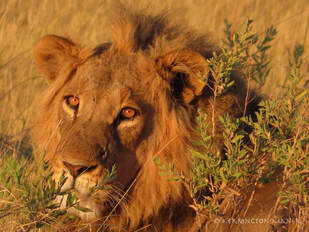 Many attributes of God are described in Scripture using references to nature:
These examples are just a handful of the passages in Scripture that utilize our understanding of nature to help us understand God. There are plenty more examples. If you've ever heard the roaring of a violent wind or experienced the intimidating presence of a lion or seen the strength of deeply rooted trees, you have had a taste of what God is like. Nature sheds light on unfathomable traits of God. 2. Learning about the natural world helps us love God with all our minds. Jesus replied: “‘Love the Lord your God with all your heart and with all your soul and with all your mind.’" Matthew 22:37 According to John Ortberg in his book Who Is This Man?, "To love God with your mind begins with being curious about God." He goes on to say, operating from the understanding that God created everything, "Therefore, anytime we learn something that's true, anytime we learned about how creation works or even about math or logic, we are actually thinking God's thoughts." He even suggests that the opposition to science is one of the most visible sins of the church. My jaw dropped when I read this. As someone who has been deeply passionate about animals and wildlife conservation since I was a kid, I have longed to see the convergence of science and faith in the church. Granted, I rarely do, and this was the first time that I felt someone had spoken out in this way about the church and its relationship with science. I was both amazed and comforted. To know that the pursuit of science — of understanding the world around us — can be seen as a method of discipleship was overjoying and encouraging to me. Learning how ecosystems function, discovering the intricacy of every interconnected biotic and abiotic factor in the world, understanding the behavior of animals in their proper contexts — all of these things help us love God with all our minds. The deeper we press in our relationship with God as individuals, the more He will reveal to us about Himself. And just like our universe, there is no end to what can be known and learned about God. 3. We come to know a creator by their creation. For since the creation of the world God’s invisible qualities — his eternal power and divine nature — have been clearly seen, being understood from what has been made, so that people are without excuse. Romans 1:20 Hey, Paul said it, not me. Here's the bottom line: nature is a reality by which we know everything around us, and there are invisible qualities of God that are clearly reflected in it. This idea makes logical sense: nature was created by God and thus is a way by which we can know and understand Him, His character and His thoughts. In what ways are His eternal power and divine nature revealed, though? I'll give you a few examples. In the same way that nature can be both relentlessly unforgiving and serenely enlivening can God be characterized by righteous wrath and unrelenting love. Or consider light, which is both a wave and a particle. This oxymoronic quality of God can be better understood by looking at nature, and that is only one of the things that we come to learn about God. As another example, take natural disasters like hurricanes, tsunamis, earthquakes, etc. They have oft been considered with negative connotations, which is understandable. They have very disastrous, real consequences that deeply affect people's lives. I have always been enamored by and drawn to them (I KNOW I'm not the only person who can say this). My friend pressed me to think about why I was so drawn to them, and this is what I concluded: they are pure power. Not arbitrary power that people are convinced they have because they hold "such and such" title. There is nothing we can do to stop natural disasters; we can only respond to their arrival with preparation. Take Hurricane Katrina, which hit New Orleans in August 2005, causing unimaginable damage along the Gulf Coast. There was nothing that could be done except prepare and respond. Natural disasters have the power to level cities and redefine our perception of normal. And yet even these are just a glimpse of the power of God: unstoppable, fierce, unpreventable, dangerous. 4. People encounter God in the wilderness. There are countless biblical accounts of people encountering God in the wilderness. Here are a few:
There are SO many more examples. This kind of encounter with God in the wilderness happens today, too. There are plenty of people who go into the wilderness and encounter God, either intentionally or unintentionally. In nature we experience a kind of freedom, an unattachment from the world by which we often find ourselves constrained. Through our relationships with Him, God wants us to be able to experience that same amount of freedom and liberation from the world, from fear, from unwarranted expectations and from so much else. The physical freedom we experience in nature is reminiscent of the spiritual freedom we encounter in the presence of God. As is evidenced throughout the Bible, nature and animals are things of importance to God. Rocks and mountains worship Him, animals trust Him to provide, the wind and the waves obey Him and the unending galaxy reflects His infinite essence. God utilizes that which He has created to help us know Him better, so I pray that we can grow in our appreciation and understanding of nature and wild animals.
I encourage you to take some time for personal reflection. Maybe take a walk or spend a few minutes outside. Look at the natural world around you: the bugs, the leaves, the flowers, the clouds, the birds. Ask the Lord to reveal Himself to you in a new way through nature or through animals. Please let me know what comes up — I'd love to hear about it. :) In honor of World Elephant Day today, I wanted to share about one of my most memorable elephant encounters in the Okavango Delta. Just before we sat down for lunch on August 3rd, I asked one of my trainers if I could accompany him and another to the watering hole — named Hidden Lagoon — to help fix the water pump that elephants had yet again uncovered. The Okavango Delta was experiencing its worst drought in decades, water had failed to reach our location yet, and Hidden Lagoon was the only place for miles that served as a dependable water source for all the surrounding animals. The water is pumped out of the ground using energy collected by a series of solar panels, pushed through pipes, and emptied into the watering hole to provide for water-dependent animals in the area. Those working at African Guide Academy tried time and time again to keep the pump and the well out of the grasp of thirsty elephants' trunks. Elephants are incredibly intelligent animals and were able to sense the water coming up from underground and going through the pipes into the watering hole. When they had consumed all the water, they went for the pump. The pump itself was covered in a cage that had been tied down with wires, some of which the elephants seemed to have snapped with their pure strength. Yet again, the elephants had exposed this pump to a point at which it had to be recovered or it would potentially be damaged. This is what we would try to remedy during the excursion. Later that afternoon Mike, Jono and I jumped into the vehicle and took off on our way to the watering hole. As we rounded a bend in the path and Hidden Lagoon came into sight in the distance, Mike and Jono both groaned upon seeing the great number of elephants that were mingling around the water. Mike counted 47 elephants and I later counted 54. They were everywhere — under every patch of shade and playing in every puddle of muddied water. One massive bull elephant was even getting a nice scratch between two trees. There were at least 5 separate breeding herds and countless bulls, and their ages ranged anywhere from one year to forty years. The quickly depleting water collection was completely surrounded by these gorgeous animals. Though it was winter and the sun was still far from its greatest strength, the midday temperatures pushed each elephant to desperation for a sip of water. As soon as we began our approach closer into the lagoon some of the elephants began clearing out. However, those who had been patiently waiting in the cool of the shade filled the empty space: we were completely engulfed in a sea of elephants. Parking between the watering hole and the pump, we were greeted by massive logs and leadwood branches strewn around, indicative of the elephants' handiwork. Mike, Jono and I were going to strategically replace the limbs in such a way that the elephants wouldn't be able to uncover the pump again. Jono shut off the vehicle and the three of us sat quietly, letting the elephants settle their nerves and grow their trust in us, though their wariness was outweighed by pure desperation for water. After about 10 minutes of waiting, strategizing and observing, Jono decided that the coast was clear. Though we were still surrounded on every possible side with elephants continuing to pour into the area, they were, at the moment, at a safe enough distance for us to begin our work Initially I sat on the edge of the vehicle, wanting to stay out of the way until instructed otherwise. I watched the way that all the different elephants interacted with each other and with us:
These different interactions occurred simultaneously, all in a matter of minutes. After a few logs were moved by Mike and Jono, I heard Mike say, "I'm sure Kerr and I can move this big one." Smiling from ear to ear, I leapt off the side of the vehicle, adrenaline coursing through my body: I was on the ground 15 meters away from several dozen elephants, trying to help preserve their water access. My heart was soaring — this was a once-in-a-lifetime experience and yet I wanted it to last forever. As soon as I joined the two on the ground, Jono went through an operating procedure with me: if an elephant came too close, I was to immediately get in the vehicle. If neither Jono nor Mike was able to get in, I was to immediately start the vehicle, which would startle the elephants enough to ward them off. When you are in that kind of situation, there can be no hesitation. You have to have an action plan established in case things go wrong. The three of us worked under the sun, strategically placing and intertwining massive limbs in hopes that the elephants would have a much harder time removing the logs if they were packed down a little better. When an elephant became too curious, Mike talked to the animal, which usually curbed its curiosity. We all laughed, bantered and worked in awe of the circumstance in which we found ourselves: surrounded by over 50 elephants on every side, moving massive logs that would take them one swish of the trunk to remove. Watching each other's backs, we kept an eye out for some of the more testy elephants. At one point, as Mike and I stood up from placing a massive log on the heaping pile, I heard a rustle and Jono say from behind me, "Uh, Kerrington, move to the vehicle and get in, but move slowly." I looked up and Mike nodded, confirming Jono's instruction as I gently set down the branch I was holding and side-stepped to the vehicle with my back towards whatever was happening in front of Jono. "Slowly, slowly…" Jono reassured. I felt excitement rather than fear, as I trusted Jono and Mike completely, knowing that hesitation or failure to heed their commands would end poorly in one way or another. After a few steps, Jono said, "Okay, quickly. Get in the vehicle quickly." Another three steps and I was in the relative safety of the vehicle, watching as Mike and Jono jumped in behind me. I looked to both Jono and Mike and was met by beaming faces, their intoxication with adrenaline just as evident as my own. An unseen elephant female — called a cow — had surprised Jono as she led her herd out of the brush towards water, coming too close for us to comfortably remain on foot. The matriarch approached the vehicle closer, trying to defend her calf and herd with a mock charge, flapping ears and trumpeting. Jono scrambled for the keys and flipped the ignition on. The growling motor startled the cow, and she soon realized not only that we weren't backing down but also that we weren't a threat. She slowly and very cautiously led her calf and herd around the vehicle to the water. At her closest, she was likely 10 meters away from us. The three of us sighed in relief, as we could now resume the nearly-completed task. "Kerrington," Jono ordered, "Stay in the vehicle and keep a watchful eye out for elephants who come too close." "Yeah, and if they do get too close, just start talking to them. They'll understand you," Mike added. As they jumped back onto the ground I returned to my perch on the edge of the vehicle, turning and trying to keep my eyes on every elephant that wandered too close. The nervous cow did approach closer, and I began talking to her, saying, "Hey now, it's okay. No need to worry about us." I spoke at a volume slightly louder than normal with inflection in my voice, similar to the way I would talk to my dogs. Jono and Mike placed the last log on the pile as an elephant approached, causing them to jump back into the vehicle. There was still one massive leadwood limb that needed to be added, but it was far too heavy for Jono and Mike to move alone. So there I sat once more, listening to Mike and Jono plan and strategize what the next move would be. Jono decided that when the nervous cow turned her back to us he would jump out and attach a tow rope to the limb so that we could very securely place it on the heap. Mike jumped into the driver's seat and I stabilized myself on the edge using the roof railing. As Jono guided Mike's driving from the back, the vehicle made its way towards Jono in reverse. The brief ride was bumpy and loud, enough to startle the elephants that were closest to us, giving Jono plenty of safe space to work. After Mike parked, Jono once again waited for things to settle before quietly slipping out to attach the tow rope. Sneaking around the corner of the vehicle, Jono was met with the questioning, watchful gaze of the cow. Mike laughed and said, "Dude, there's no way you're sneaking up on her." Jono shook his head laughing and attached the tow rope to the branch before stepping back by the vehicle once more. "Alright, drive," Jono told Mike. As he accelerated I felt the resistance of the massive limb, which eventually cracked under all the force. Finally, Mike stopped the vehicle. "Mike," Jono laughingly started, "Come take a look at this — there's no way they're getting these off now." Mike climbed down the side of the vehicle for a look as I clambered over three rows of seats to get a look. The limb had literally been warped and pressed onto the others. We were fully convinced that the elephants would not be able to get those off. Satisfied with our work we all sat back in the vehicle, watching the elephants once more before heading back to camp. Much to our disappointment, though I wasn't incredibly surprised, by the time we returned to Hidden Lagoon the next afternoon our contraption had been completely removed by the elephants, serving as a humble reminder of their vast strength compared to our own.
That afternoon serves as one of my favorite memories from my first trip to Botswana, and it is a treat to vicariously relive it on this World Elephant Day. |
1 Thess. 2:2"...but with the help of our God we dared to tell His gospel in the face of strong opposition." Categories
All
Archives
April 2023
|
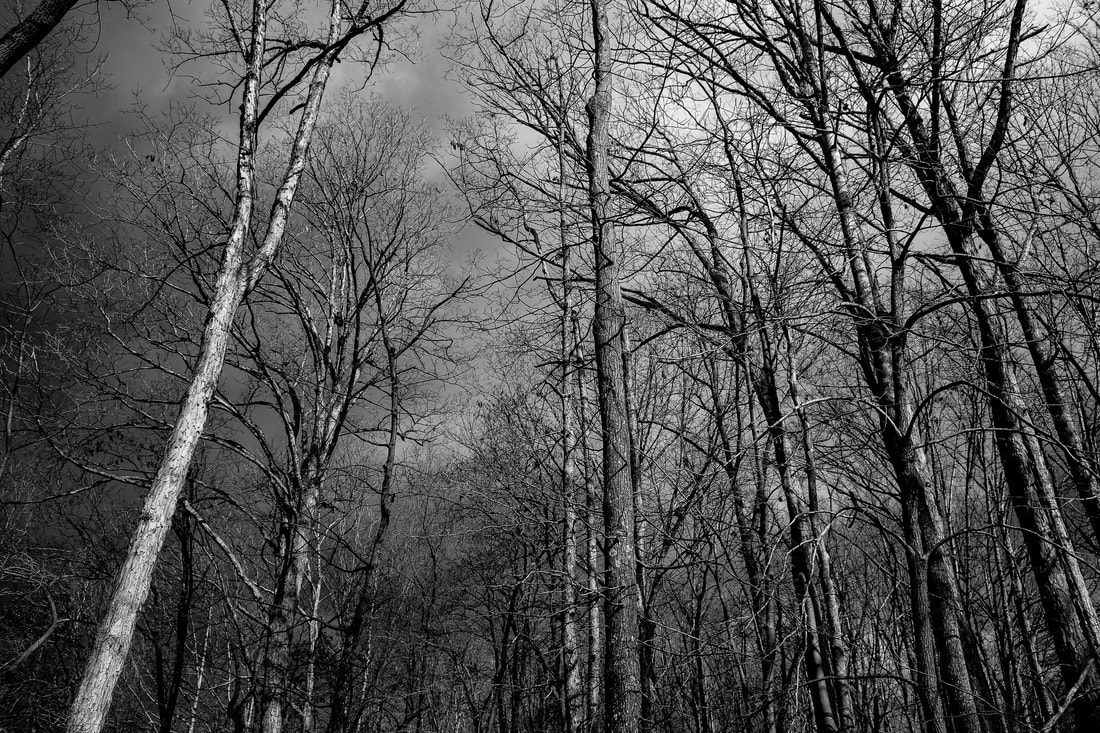

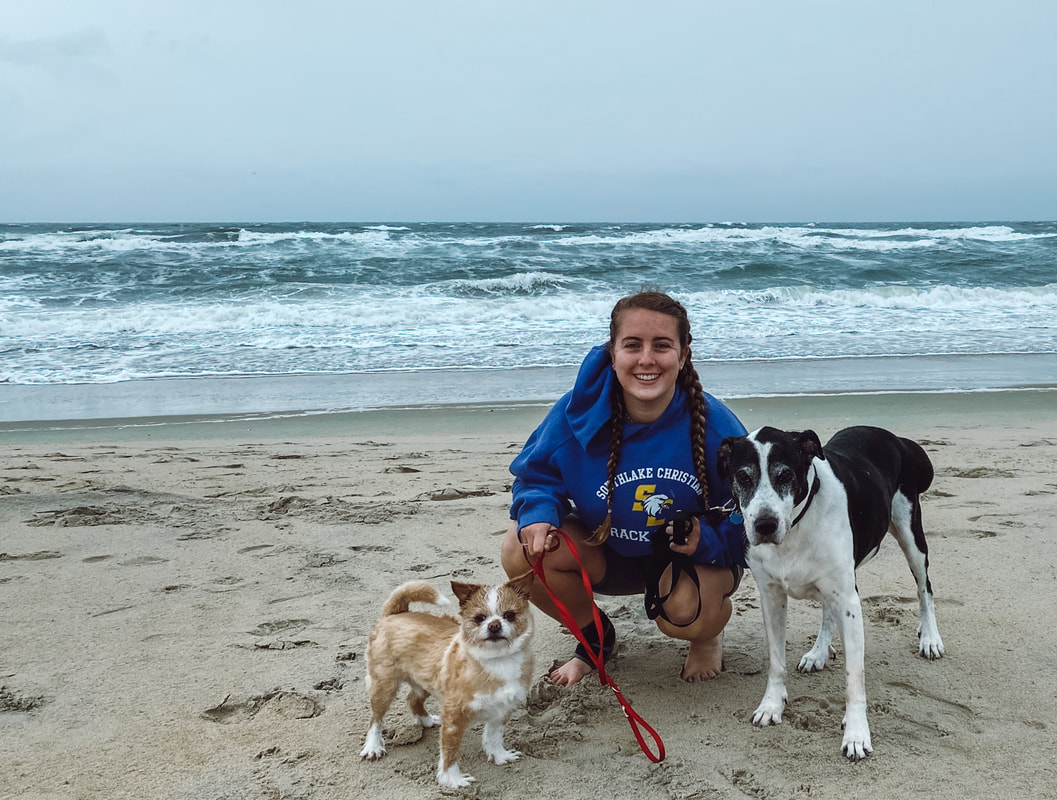
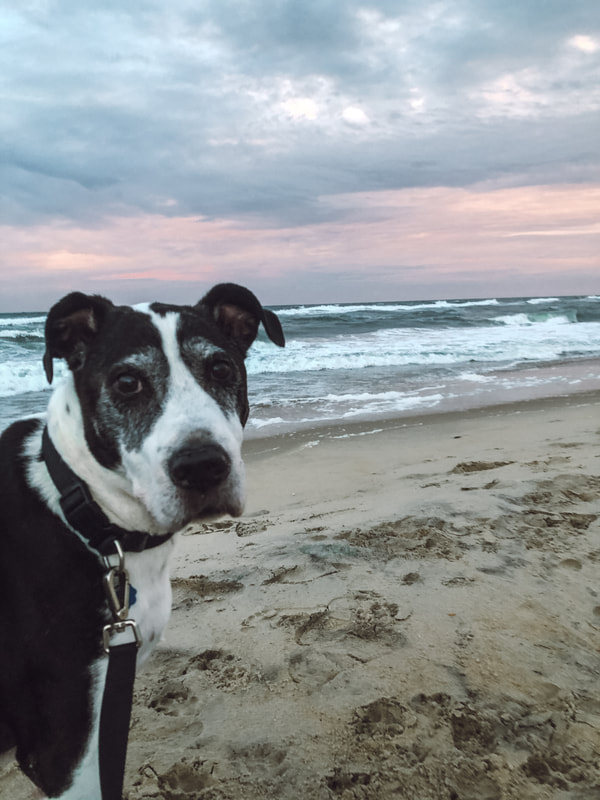
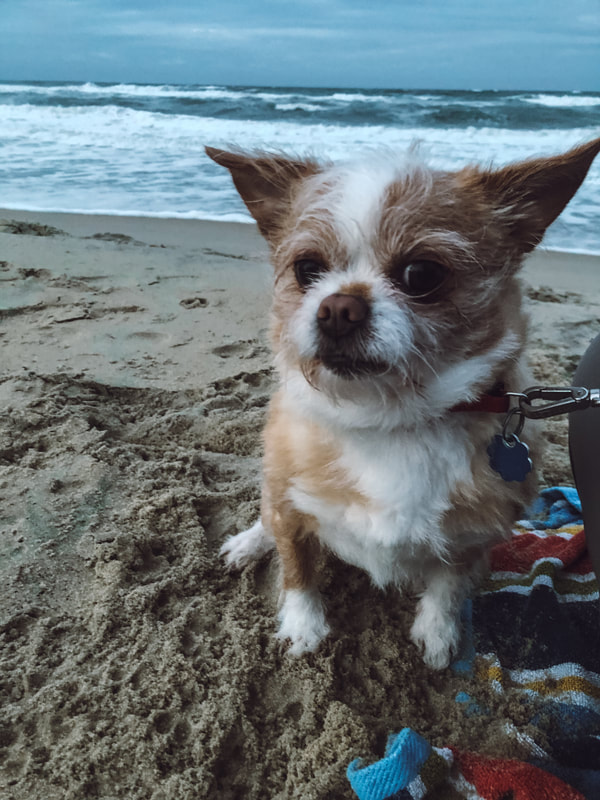
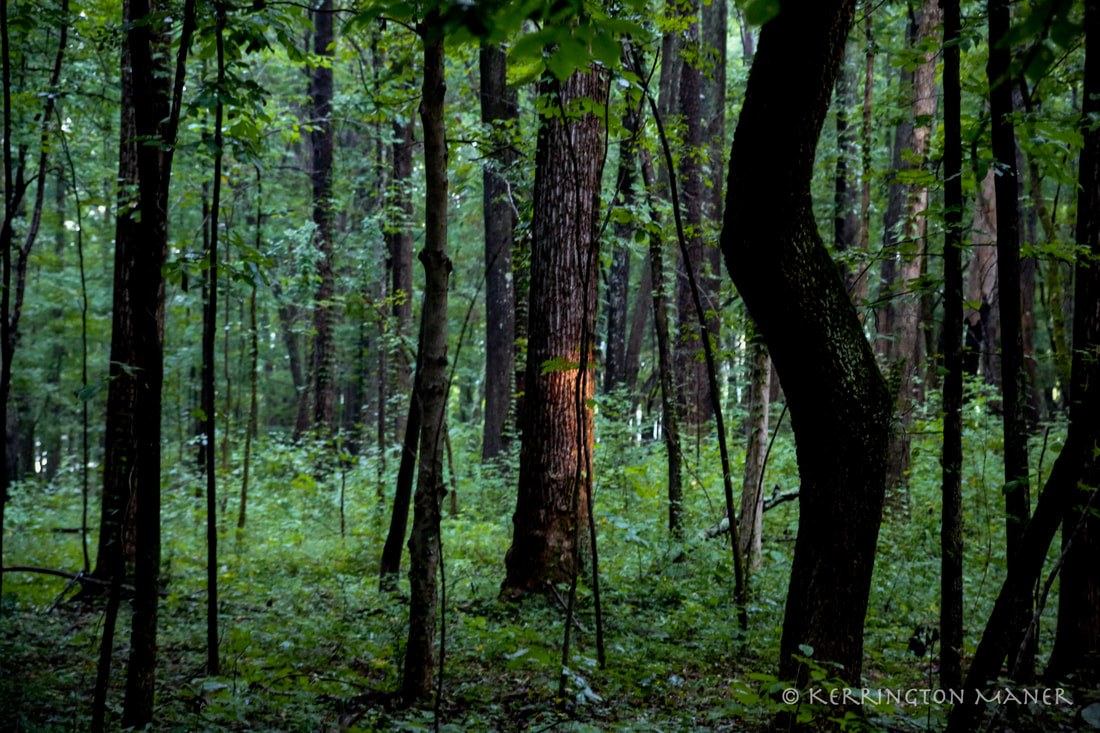
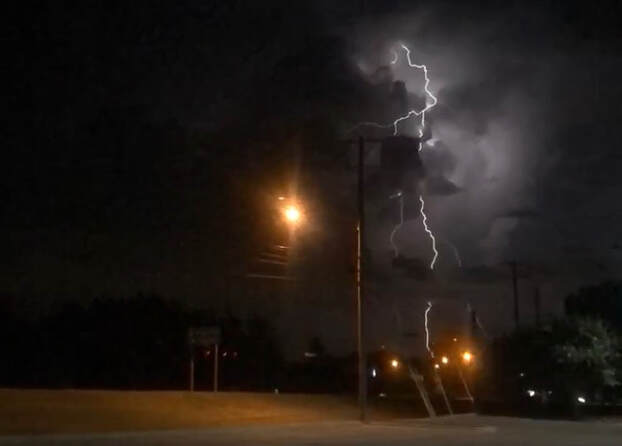
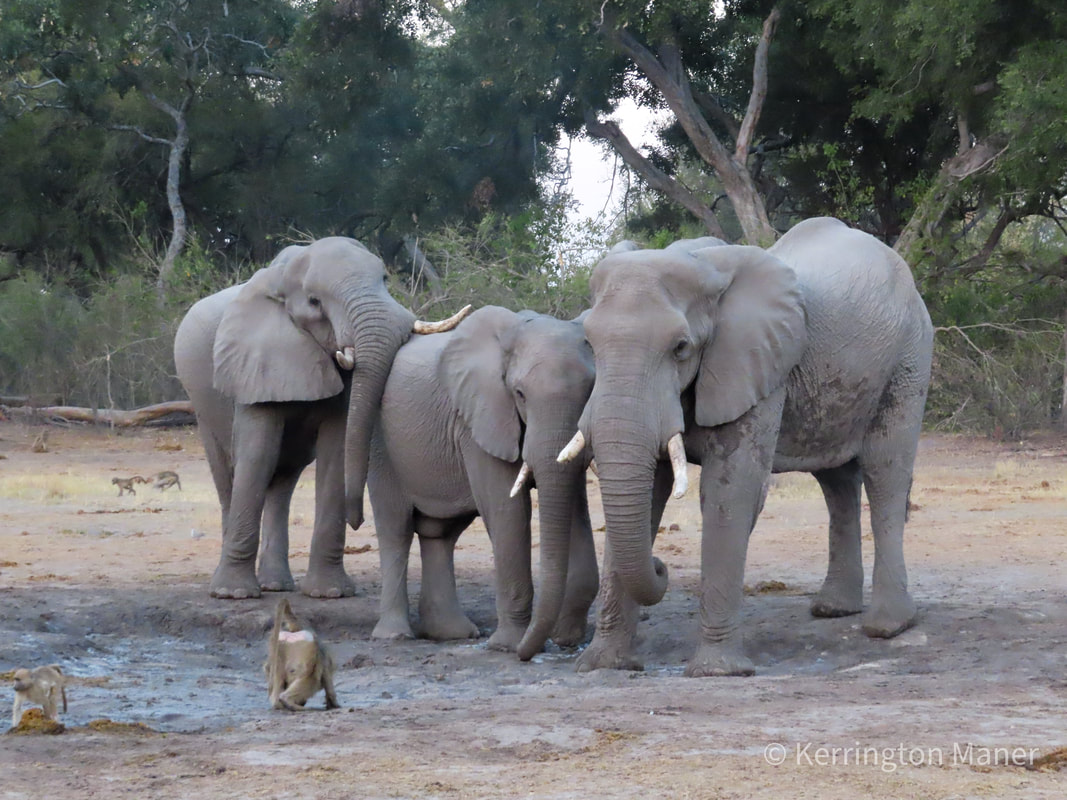
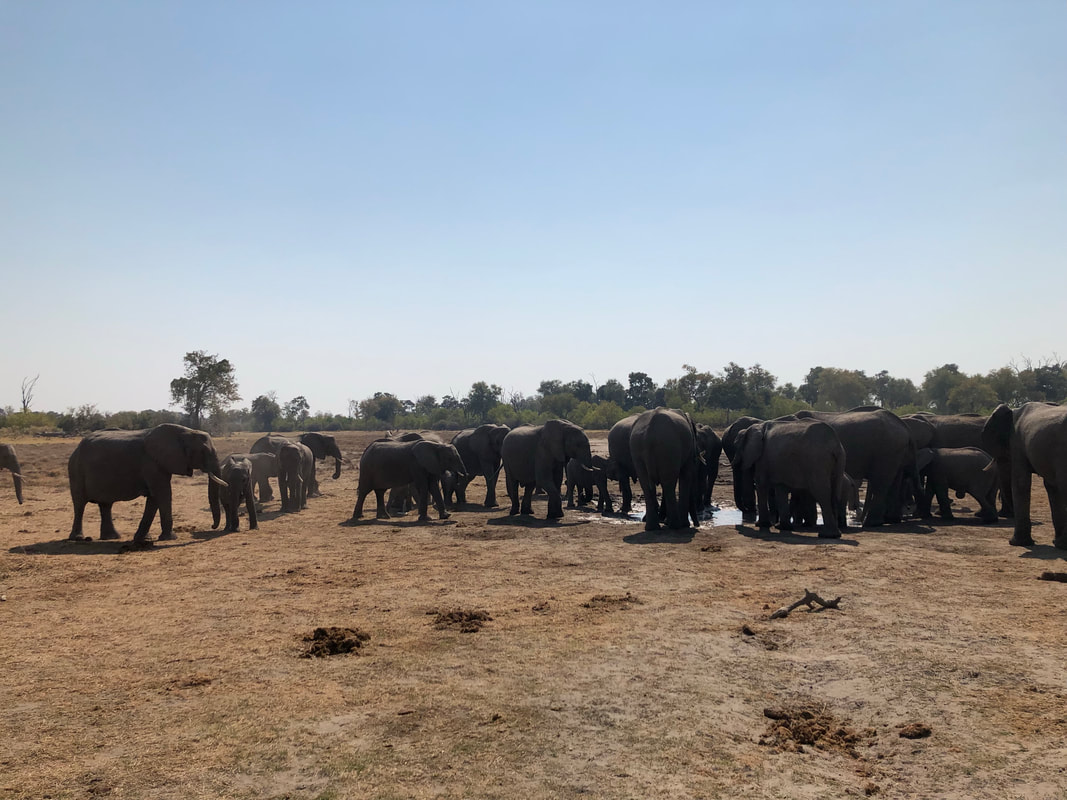
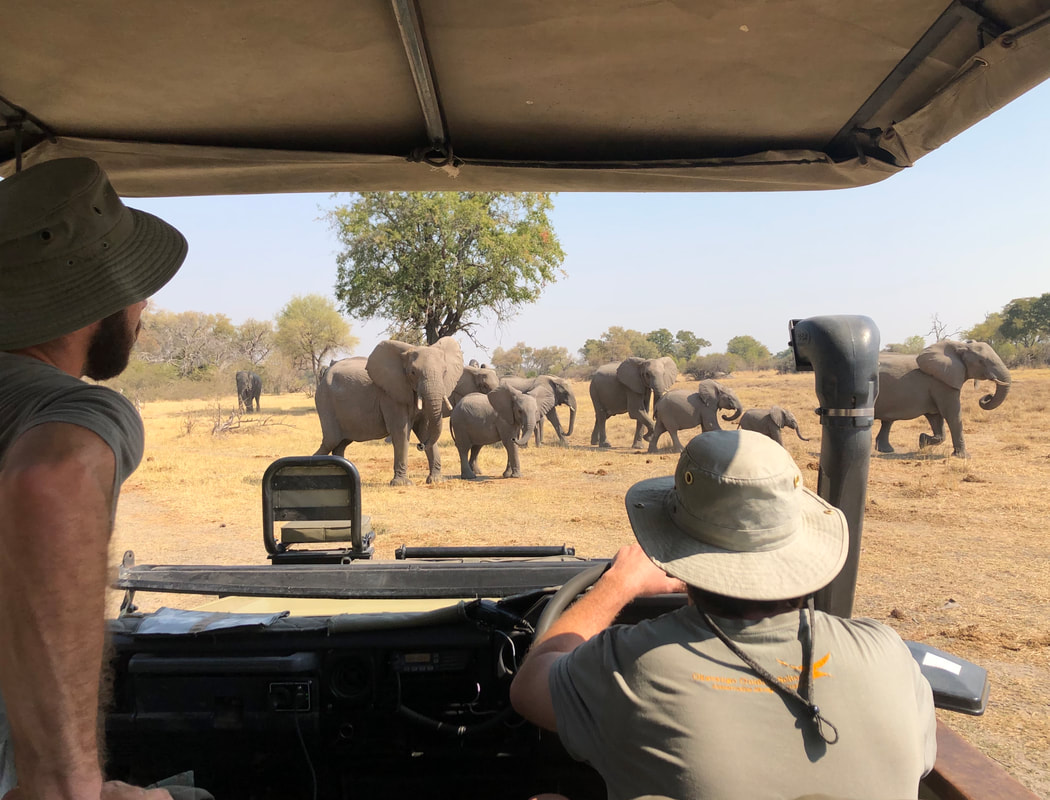
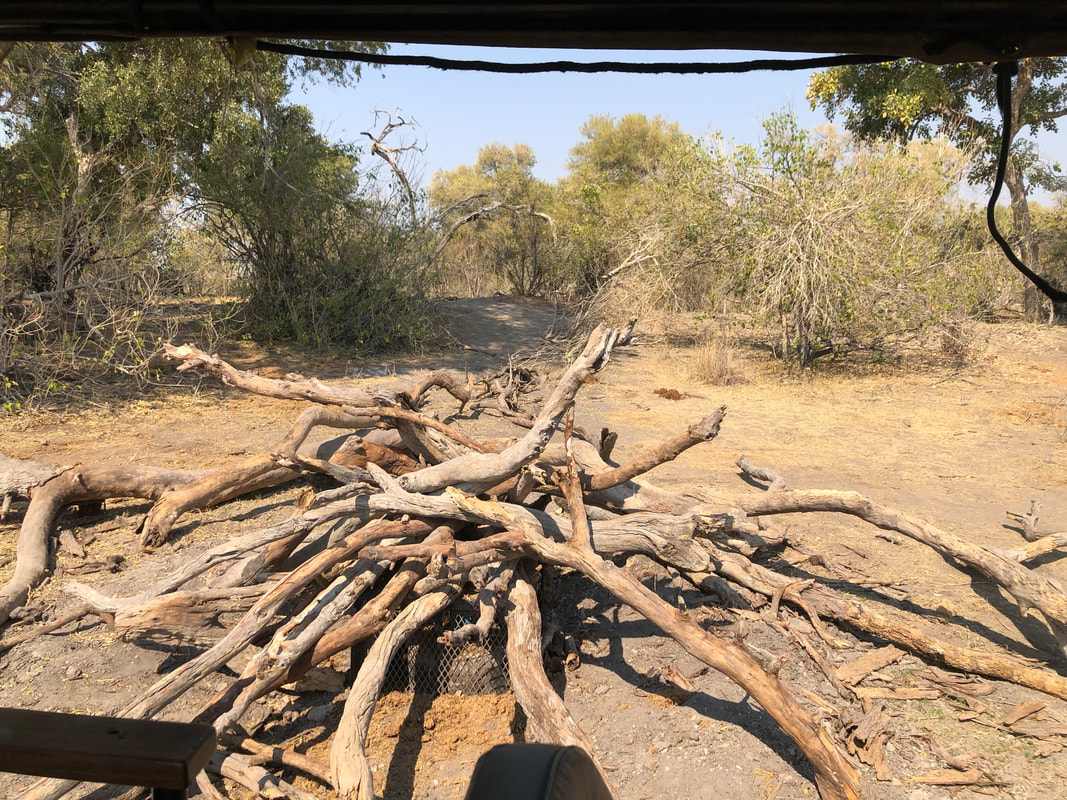
 RSS Feed
RSS Feed
